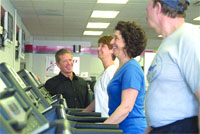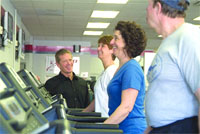
Open for Business

David Garvey, left, says club members enjoy the individual attention they can receive at Snap Fitness.
Not everyone works a 9-to-5 work schedule, David Garvey said. So why should everyone have the same scheduling options when choosing a gym?
Thats the philosophy behind Snap Fitness 24-7, a national chain of workout centers that stay open all the time, catering to fitness enthusiasts morning, afternoon, and well into the night.
In fact, said Garvey, who opened the Snap franchise in Holyoke six months ago, there are plenty of third-shift workers policemen and restaurant employees, to name a few for whom working out at 2 or 3 in the morning is nothing unusual. And while some women might be hesitant to go to a fitness club in the wee hours, he said members can wear a necklace with a device that connects with Snaps security system and can summon police or fire responders.
Its a high-profile section of Holyoke and a very safe neighborhood, he said of the gyms location in a small shopping plaza on Westfield Road, not far from the Holyoke Mall. Initially, some people worry about security, but once they check us out, they tend to feel comfortable in this environment. Ive left at 9:30 at night, and a few women are there working out, and theyre not bothered by it. Actually, its like their own private club.
Garvey said he made it a priority to choose a well-trafficked neighborhood, rather than putting one in the middle of nowhere, because of those security concerns. Weve really caught on with people in this section of Holyoke, and we continue to grow.
In this issue, BusinessWest examines why, in this age of massive workout centers, the benefits of a smaller, more personalized gym experience has Garvey excited and has his members showing up at all hours.
Perfect Fit
Garvey, who grew up in Easthampton, has always been interested in fitness, but it took him more than a decade to turn an inspiration into a working business.
Ive always been well, I dont want to say a gym rat, but exercise has always been an important part of my life, he said. I played a number of sports in high school and college, and I still play hockey, and I cycle. This was always a passion I had.
When his brother, who owns a couple of gyms in California, became ill in 1995, Garvey went to the West Coast for awhile to help run his facilities, and decided that was the sort of business hed like to eventually pursue.
Garveys original goal was to open a big-box fitness center in the Eastworks complex in Easthampton, but after 18 months of planning, that idea was scuttled over parking and other issues. He still wanted to be in the fitness business, but as he regrouped, he noticed a trend.
All of a sudden, the industry shifted, where you saw these smaller types of facilities start to get popular, and the ones with the 24/7, convenience factor, he said. Two chains dominate the always-open market: Anytime Fitness and Snap Fitness, and Garvey decided Snap was more in line with what he was looking for, particularly the policy of no contracts to financially commit club members long-term.
A contract is a turnoff. Im selling a service here, he said. This model doesnt lock me in so that I say, this members here for two years, and isnt going anywhere so I go out of my way to keep my members happy. They laugh because Im always cleaning, but they appreciate that. They know that, after someone takes a shower, I go clean the shower. You dont find that in many facilities.
As for the location, I did my due diligence, Garvey said. I have a background as a commercial appraiser, and as I searched for a property, I wanted something in a mixed-use, light-retail area, not a major mall, something that would draw people from a one- to three-mile radius, who could drive, walk, or ride a bike. This is a neighborhood gym, and our membership is an indication of that, although were also drawing from Southampton and Easthampton.
Snap Fitness sees a mix of demographics, Garvey said, with a customer base that includes some high-school and college students but skews more toward professional people.
I have two clients, who are 76 and 78 years old, said Mark West, the gyms personal trainer. Then we have college-age people and everyone in between. Generally, the we get someone for whom Curves is no longer an entry point; theyre looking for the next level, but theyre still looking for a cleaner, smaller, more personalized workout space. This is a highly personalized environment, and the place has a neighborhood feel to it.
West centers his workout philosophy around locating someones strength core and basing a program around that. He calls it integrated strength training looking at the body systemically and training it as an integrated system.
Its an approach thats very different from what people might be accustomed to, he explained. Its not about sending someone to a machine and counting reps. A trainer has to be more focused and make diagnostic assessments. Theres a learning curve, and the exercises get steeper; its not something youll master in three sessions. Its about working smarter, not harder, and once people figure out how to work out according to their bodys abilities, they realize their workout can be more productive.
Get Moving
Snap boasts a range of weight-training and cardiovascular equipment, and all new members get an exhaustive consultation to determine what sort of fitness program would suit them best. There are no large exercise classes, but West facilitates small-group and individualized training sessions for those who want them and like the membership itself, its pay as you go.
David understands that personal training should be the focal point of a gym, West said. Its not about selling smoothies and handing out towels; its about caring for your membership. He sees this as an integral part of the business.
Garvey would like to expand to other franchise locations, but for now hes growing steadily in Holyoke the gym is up to 340 members now without the constant pressure to add membership that, he said, tends to afflict larger workout chains.
Were not driven by numbers, like some of the big boxes are, he stressed. Were more service-oriented, and the model sells itself; my best advertising is word of mouth. Its not for everyone, but some people are looking for something different they want to spend an hour, do their cardio work and stretching, get in and get out without waiting in lines. They love the convenience factor, and theres no heavy sales pitch.
Im not trying to knock on the big clubs, he insisted. But were offering an alternative for people. Its a newer model, and its taken some time, but its starting to catch on.
Joseph Bednar can be reached at[email protected]






